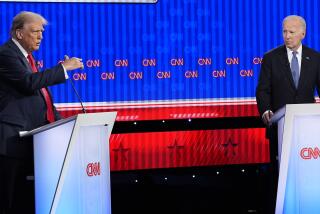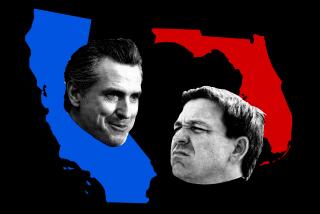Battles Bush Labels : Dukakis Fights to Take Control of Own Image
- Share via
WASHINGTON — Underlying the confrontation between Republican nominee George Bush and Democratic standard-bearer Michael S. Dukakis in their nationally televised debate Sunday night was another and ultimately more crucial encounter.
This was the showdown between Dukakis and the image Bush has painted of Dukakis as someone outside the American “mainstream” and thus unfit to govern the country.
Both Democratic and Republican strategists agree that one big reason Dukakis trails Bush in public opinion surveys is that Bush’s version of Dukakis has overshadowed Dukakis’ own portrait of himself as a bold but pragmatic leader.
Expunge Impression
For Dukakis to do well in the debate, many political professionals and other analysts felt in advance, it would not be necessary for him to grind Bush into the dust. But it would require Dukakis to expunge from the minds of voters the impression of him that Bush has labored to create.
This conflict came to a head barely 30 minutes into the hour-and-a-half debate when Dukakis--in what was clearly a calculated move--sought once and for all to stop the relentless Republican attack that had dogged his once-buoyant campaign for weeks.
“I hope this is the first and last time I have to say this . . . “ Dukakis began in one of the most dramatic moments of the evening. “My parents came to this country as immigrants. They taught me that this was the greatest country in the world. I’m in public service because I love this country. And nobody’s going to question my patriotism as the vice president has now repeatedly.”
With those words Dukakis met head-on the challenge from Bush, who has made an issue of the Massachusetts governor’s veto of a bill requiring schoolchildren to recite the Pledge of Allegiance and on his membership in the American Civil Liberties Union.
What Dukakis had finally done was to stack his beliefs about the competing values of American society up against Bush’s own beliefs--with the outcome of the campaign’s first debate, and potentially the election itself, hanging in the balance.
No one could tell in the immediate aftermath of Sunday night’s encounter what the voters would decide. But few could doubt the importance of the argument.
The clash on this underlying point was touched off by ABC anchorman Peter Jennings who challenged Dukakis about his lack of passionate commitment to such causes as the civil rights movement and opposition to the Vietnam War. Jennings described Dukakis as “technocratic--the smartest clerk in the world.”
Dukakis answered by declaring that “I care deeply about people.” But then Bush leaped into the fray, seemingly coming to Dukakis’ defense by rebutting the premise of Jennings’ question.
Questions Judgment
The problem with Dukakis, Bush said, was not that he was not passionate enough. “I don’t question his passion,” Bush said, but his judgment. The Massachusetts governor is too passionate about the wrong things, the GOP nominee declared:
“Last year in the primary he expressed his passion,” Bush said. “He said, ‘I am a strong liberal Democrat.’ Then he said, ‘I am a card-carrying member of ACLU.’ That was what he said. He is out there on out of the mainstream. My argument with the governor is, do we want this country to go that far left?”
When Jennings pressed Bush on what was wrong with ACLU membership, Bush responded, “Nothing wrong with it,” but then he drove home his attack against Dukakis by ticking off a list of ACLU positions unlikely to sit well with the uncommitted Middle Americans who will decide the November election.
“I don’t agree with a lot of the positions of the ACLU,” Bush said. “I don’t want my 10-year-old grandchild to go into an X-rated movie. I don’t think they’re right to try to take the tax exemption away from the Catholic church. I don’t want to see ‘under God’ come out from our currency.”
“That was a very damaging litany Bush recited,” said University of Texas debate specialist Kathleen H. Jamieson. “And Dukakis had no answer for it.”
What the governor did instead, in the best tradition of bare-knuckled Boston politics was to counterattack. He accused Bush of accusing him of being unpatriotic. “It was a much better tactic than his first response to the Pledge of Allegiance controversy,” Jamieson said.
Defense Held ‘Legalistic’
When the issue first loomed early in the campaign, Dukakis defended his veto of the Massachusetts law on constitutional grounds. “That was too legalistic,” Jamieson said. “He was better Sunday night because he was more emotional and human.”
Indeed it was one of the few points in the debate when Dukakis did what many critics had suggested in advance that he needed to do--personalize his candidacy. Apart from the brief reference to his immigrant parents during his patriotism counterattack, and then again in his closing statement, Dukakis otherwise was as cool and controlled as usual.
“Wouldn’t it be nice to be perfect. Wouldn’t it be nice to be the iceman so you never made a mistake,” Bush jabbed at one point after he himself had misspoken, confusing the names of the Minuteman and Midgetman nuclear missiles.
But such minor skirmishes did not diminish the significance of the main struggle of the evening--Bush’s effort to reinforce his picture of Dukakis as a classic big spending Democratic liberal and the Massachusetts governor’s battle to reshape that image.
“One thing I will not do,” said Bush when asked how he would meet the need for expanded health insurance coverage “is sock every business in the country and thus throw some people out of work.” This was a reference to Dukakis’ much-heralded plan in Massachusetts which requires all sizable companies to offer health insurance to their workers.
Bush claimed the cost of Dukakis’ program, if established nationally, would be $35 billion to $40 billion. “And it seems to me that somebody pays that. There isn’t any such thing as something ‘free’ out there,” Bush said.
Shows Similar Problems
If Dukakis entered the debate with an urgent need to regain control of his own image, Sunday’s debate showed Bush has similar problems with the Democrats’ portrayal of his past.
The vice president found no effective way of preventing Dukakis from repeatedly reminding viewers of the conflict between Bush’s claims to foreign policy expertise and his role in the Iran-Contra affair. Similarly, Dukakis hammered Bush for claiming he was committed to fighting drugs but supporting the Reagan Administration’s dealings with Panamanian strongman Manuel A. Noriega, who has been indicted for narcotics trafficking.
“The vice president has a long resume, but it didn’t stop him from endorsing the sale of arms to the ayatollah,” Dukakis said. And for good measure the Democrat also brought up Bush’s past praise for deposed Philippine dictator Ferdinand E. Marcos.
It was a tactic that, besides nettling Bush, was intended to distract attention from the steady attack mounted by Bush on Dukakis’ inexperience and alleged weakness on national security issues.
Battle Continued
The battle over Dukakis’ image persisted into the closing statements of both candidates. Bush, summing up, said: “In the final analysis, the person goes into that voting booth they’re going to say: Who has the values I believe in.”
Dukakis, seeking to refute the charge by Republicans that his criticism of Reagan Administration economic policies made him a prophet of “gloom and doom” like 1984 Democratic nominee Walter F. Mondale, said:
“I am more optimistic today than I was when I began (the campaign),” concluding with a line that might well have been uttered by the nation’s most successful political optimist, Ronald Reagan.
“The best America is not behind us,” Dukakis said. “The best America is yet to come.”
More to Read
Get the L.A. Times Politics newsletter
Deeply reported insights into legislation, politics and policy from Sacramento, Washington and beyond. In your inbox twice per week.
You may occasionally receive promotional content from the Los Angeles Times.










